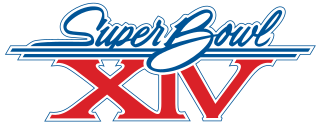
Super Bowl XIV was an American football game between the National Football Conference (NFC) champion Los Angeles Rams and the American Football Conference (AFC) champion Pittsburgh Steelers to decide the National Football League (NFL) champion for the 1979 season. The Steelers defeated the Rams by the score of 31–19, becoming the first team to win four Super Bowls. The game was played on January 20, 1980, at the Rose Bowl in Pasadena, California, and was attended by a Super Bowl record 103,985 spectators. It was also the first Super Bowl where the game was played in the home market of one of the participants, as Pasadena is 10 miles (16 km) northeast of Downtown Los Angeles.
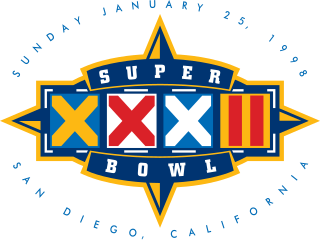
Super Bowl XXXII was an American football game played between the National Football Conference (NFC) champion and defending Super Bowl XXXI champion Green Bay Packers and the American Football Conference (AFC) champion Denver Broncos to decide the National Football League (NFL) champion for the 1997 season. The Broncos defeated the Packers by the score of 31–24. The game was played on January 25, 1998, at Qualcomm Stadium in San Diego, California, the second time that the Super Bowl was held in that city. Super Bowl XXXII also made Qualcomm Stadium the only stadium in history to host both the Super Bowl and the World Series in the same year.

Super Bowl XXXV was an American football game between the American Football Conference (AFC) champion Baltimore Ravens and the National Football Conference (NFC) champion New York Giants to decide the National Football League (NFL) champion for the 2000 season. The Ravens defeated the Giants by a score of 34–7, tied for the seventh largest Super Bowl margin of victory with Super Bowl XXXVII. The game was played on January 28, 2001, at Raymond James Stadium in Tampa, Florida, making it the first time Raymond James Stadium has held a Super Bowl.

The Purple People Eaters was a nickname for the defensive line of the Minnesota Vikings from 1967 to 1977, consisting mainly of Alan Page, Carl Eller, Jim Marshall, Gary Larsen, and Doug Sutherland.

John Frederick Dryer is an American actor, radio host, and former professional football player.
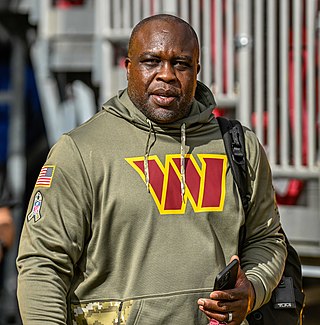
London Levi Fletcher-Baker is an American former linebacker who played for 16 seasons in the National Football League (NFL) with the St. Louis Rams, Buffalo Bills, and Washington Redskins. He played college football at John Carroll and signed with Rams as an undrafted free agent in 1998. After four seasons with the Rams, he was a member of the Bills for five seasons and spent his last seven seasons with the Redskins. He made four Pro Bowls during his Redskins tenure and won a Super Bowl title with the Rams in Super Bowl XXXIV.
Larry Christopher Allen Jr. is an American former football guard who played in the National Football League (NFL) for fourteen seasons, primarily with the Dallas Cowboys. He played college football for the Butte Roadrunners and the Sonoma State Cossacks, and was selected by the Cowboys in the second round of the 1994 NFL draft. Allen is regarded as one of the NFL's physically strongest players ever, while also capable of using his speed against defenders.
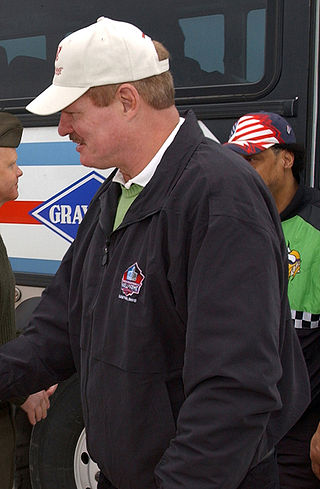
Theodore Paul Hendricks, nicknamed "the Mad Stork," is a former professional American football linebacker who played for 15 seasons with the Baltimore Colts, the Green Bay Packers, and the Oakland / Los Angeles Raiders in the National Football League (NFL).
Grant Alden Wistrom is an American former professional football player who was a defensive end in the National Football League (NFL) for nine seasons. Wistrom played college football for the Nebraska Cornhuskers and was a two-time All-American. He was selected in the first round of the 1998 NFL draft, and played in the NFL for the St. Louis Rams and Seattle Seahawks.
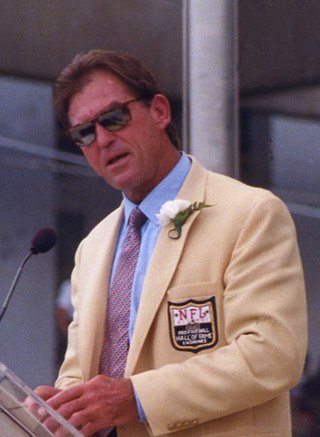
Herbert Jackson Youngblood III is an American former professional football player who was a defensive end for the Los Angeles Rams of the National Football League (NFL) for fourteen seasons during the 1970s and 1980s. He was a five-time consensus All-Pro and a seven-time Pro Bowl selection and was inducted to the Pro Football Hall of Fame. Before playing professionally, Youngblood played college football for the University of Florida, and was recognized as an All-American. He is considered among the best players Florida ever produced—a member of the College Football Hall of Fame and one of only six Florida Gators to be named to the Gator Football Ring of Honor.
Byron Keith Traylor is a former American football nose tackle who played 17 seasons in the National Football League (NFL). He was originally drafted by the Denver Broncos in the third round of the 1991 NFL Draft. He played college football at Central Oklahoma. Traylor has won a total of three Super Bowl rings; he won two with the Denver Broncos and one with the New England Patriots.

Christopher Snee is an American former professional football player who spent his entire ten-year career as a guard for the New York Giants of the National Football League (NFL). He played college football for Boston College and was chosen by the Giants in the second round of the 2004 NFL draft. Snee earned two Super Bowl rings with the Giants in Super Bowl XLII and Super Bowl XLVI, both over the New England Patriots.

James Wilson Jeffcoat, Jr. is an American former professional football player who was a defensive end in the National Football League (NFL) for the Dallas Cowboys and Buffalo Bills. He played college football for the Arizona State Sun Devils. He won two Super Bowls with the Cowboys over the Bills. After his playing career, he became a coach.

Kevin Louis Carter is an American former professional football player who was a defensive end in the National Football League (NFL) for 14 seasons in the 1990s and 2000s. Carter played college football for the Florida Gators, earning All-American honors. A first-round pick in the 1995 NFL draft, he played in the NFL for the St. Louis Rams, Tennessee Titans, Miami Dolphins, and Tampa Bay Buccaneers.

James J. Schwartz is an American football coach who is the defensive coordinator for the Cleveland Browns of the National Football League (NFL). He was head coach of the Detroit Lions from 2009 to 2013. He was also defensive coordinator for the Tennessee Titans from 2001 to 2008, Buffalo Bills in 2014, and Philadelphia Eagles from 2016 to 2020. In addition, Schwartz was the Senior Defensive Assistant for the Titans from 2021 to 2022. He won Super Bowl LII with the Eagles in 2018.

Christian G. Hanburger, Jr. is an American former professional football player who was a linebacker in the National Football League (NFL). He played his entire 14-year career with the Washington Redskins, from 1965 through 1978, and was elected to the Pro Football Hall of Fame in 2011.
Todd William Lyght is a former professional American football player and former defensive backs coach for the Notre Dame Fighting Irish.

Bill Davis is an American football coach who is the linebackers coach for the Houston Texans of the National Football League (NFL).

Christopher Howard Long is an American former football defensive end who played in the National Football League (NFL) for 11 seasons. The son of Hall of Fame defensive end Howie Long and older brother of NFL guard Kyle Long, he played college football at the University of Virginia and won the Ted Hendricks Award as a senior. Long was selected by the St. Louis Rams second overall in the 2008 NFL Draft, where he spent eight seasons. He later played one season for the New England Patriots and two for the Philadelphia Eagles, winning a Super Bowl title with each.
George Eldon Andrews, II is an American former professional football player who was a linebacker in the National Football League (NFL). He is a graduate of the University of Nebraska who played in the National Football League (NFL) from 1979 to 1984 for the Los Angeles Rams.















